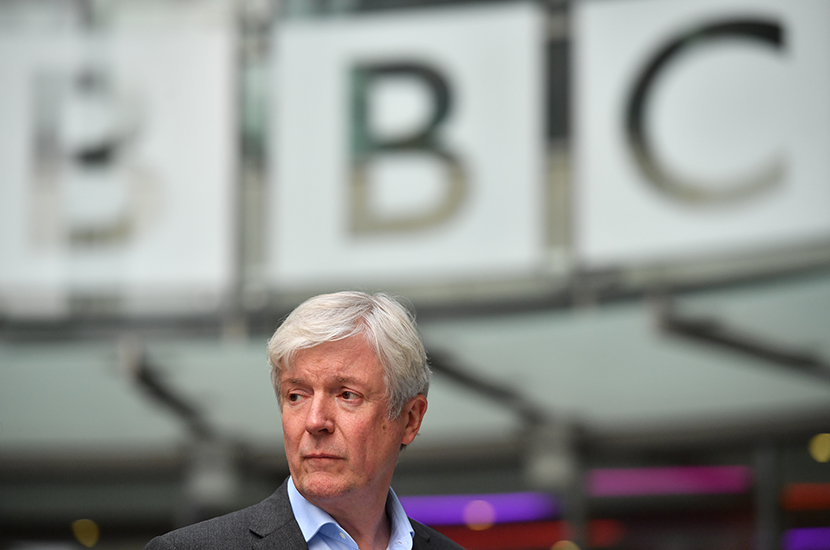Reading the speech Tony Hall gave to the Edinburgh Television Festival, I was struck by his upbeat, confident tone. The outgoing director-general of the BBC talked about how its reporting of the coronavirus crisis had brought its core mission as a public service broadcaster into sharper focus and boosted its popularity, particularly among 16- to 34-year-olds. He said his goal when he arrived at the BBC was to reach a global audience of 500 million by 2022, its centenary year, and this target has now been revised upwards to a billion by the end of the decade. ‘But it needs extra investment from government and that bid is with them right now,’ he said.
Doesn’t Tony Hall realise that the BBC’s future is hanging by a thread? The corporation struck a deal with the government five years ago whereby it promised to cover the cost of providing free TV licences to the over-75s in return for hiking up the licence fee, and it has now reneged on that deal. As of this month, three million pensioners will have to fork out £157.50 a year if they want to watch television — not just the BBC, but any live TV at all. In response, Oliver Dowden, the Culture Secretary, said the government would look seriously at decriminalising non-payment of the licence fee. If that happens, the BBC is toast. Who in their right mind is going to pay a voluntary fee to the BBC just for the privilege of owning a television set, particularly when they’re already subscribing to Sky, Netflix, Amazon Prime, Apple TV, Disney+ and God knows what else?
Doesn’t Tony Hall realise that the BBC’s future is hanging by a thread?
Seemingly oblivious to this iceberg hoving into view, the cheerful captain boasted about the £100 million he has ring-fenced in the commissioning budget to pay for ‘diverse and inclusive programming’ and the 20 per cent ‘diverse-talent target’ he’s put in place — as if that’s going to save the ship. When Hall talks about ‘diversity’ you can bet your bottom dollar he doesn’t mean commissioning more programmes from Brexit–supporting, Tory-voting global-warming sceptics. Nor does he mean over-65s, with the exception of Sir David Attenborough. Nor, I suspect, will the BBC be including people who live in rural areas in its ‘diverse-talent target’, particularly if they hunt or shoot. No, he means more BAME people, even though they only make up 13 per cent of the population.
But perhaps the most tone-deaf part of Hall’s speech was the section on the vital work the BBC has been doing to combat all the ‘fake news’ and ‘misinformation’ about Sars-CoV-2 that’s been disseminated by bad actors like Donald Trump. The BBC, he said, has provided people with a trusted source of news that has helped them ‘navigate a path through the Covid crisis’.
In fact, the BBC has done colossal harm to its reputation since the beginning of the pandemic by faithfully regurgitating all the information it’s been fed by the public authorities, becoming little more than a propaganda arm of 10 Downing Street. A responsible public service broadcaster would have stepped into the breach after parliament was suspended, scrutinising the big government decisions such as clearing out hospital wards, cancelling all non-emergency surgery, suspending cancer screenings, shutting down GP practices and turning the NHS into a Covid-only service.
But instead of challenging this daft strategy, the BBC did everything it could to make it seem sensible, broadcasting story after story about patients battling with the virus, kept alive by selfless and exhausted NHS staff. We’ll be living with the consequences of that failure for years, with one eminent oncologist predicting we’ll see 30,000 preventable deaths from cancer alone in the next decade.
The BBC solemnly broadcast the daily death tolls handed over by Public Health England, even though we now know that PHE included anyone who’d tested positive for Covid-19 and subsequently died, regardless of how much time had passed between those two events. Why wasn’t that error, which led to PHE inflating the death toll by more than 5,000, exposed by the BBC, given the vast journalistic resources at its disposal? Was it too much to hope that its army of ‘data scientists’ would scrutinise the numbers the BBC was broadcasting to the nation every day?
When the British public realises it’s been sold a pup about this ‘crisis’, as it surely will, it won’t be long before they start looking for someone to blame. Perhaps it’s just as well Tony Hall is about to retire.







Comments